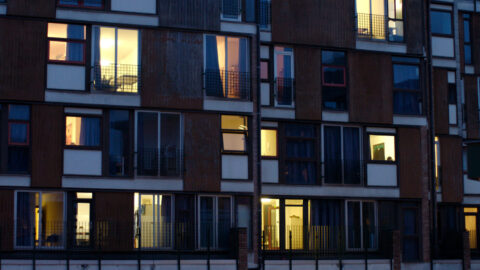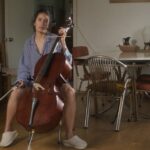There is a house being built near me. I notice its progress every time I walk my dog. In the past few months or so, after a fairly long foundation process, the entire frame has been assembled, piecemeal, with a simple wooden structure. It will look, probably, like most other houses in my residential, middle-class area that retains a rural feel despite being fairly close to Berlin’s city centre. But I still can’t help but notice how much quicker a wooden frame can be put together than traditional brick-and-mortar.
I’m not much of an architect myself, but a city like Berlin — with its mixture of 19th-century buildings, Bauhaus designs and brutalist structures — inspires alternative thoughts of city planning and living. The sheer diversity on offer prompts one to imagine what the ideal living situation might look like. It also makes Berlin a great place for the German premiere of the modest Walloonian documentary Life, Assembled (Elodie Degavre, 2022) — a discursive, digressive exploration of utopian thinking in architecture.
I must admit, in comparison to German design — especially the orderliness of rural housing, and the experimentation and bold Scandi-like style of outer Berlin and Brandenburg housing — Belgian architecture looks rather haphazard and chaotic.
When I pass through on the train, I see plenty of close-together terraced housing, with the capital of Brussels in particular giving off a rather depressing feel. The Dutch-speaking exodus from the city, causing it to have the lowest income per household in the entire country, probably doesn’t help either. Yet, perhaps with the right leadership, the country can be transformed into a hub of forward-thinking ideals. Life, Assembled certainly gives the government a few hints in the right direction.
Architect-turned-director Degavre looks towards the ideals of the 70s, born out of the May 68 movement, as a means to tackle questions of housing today, exacerbated by a Europe-wide cost of living crisis. There’s the recently deceased Lucien Kroll, the founder of participatory architecture, which consults the inhabitants on how they want the building to look, and the creator of the famous La Mémé student housing complex in Brussels; there’s Paul Petit, whose Sart Saint-Nicolas complex pioneered the use of steel in housing complexes; and there’s Jean Englebert, the founder of the Architecture and Urban Planning research centre, who focusses predominantly on the use of pre-fabrication in architecture. Working in chorus together, rather than at odds with one another, they form a strong discourse on what they got right, and how the government could do things differently, more affordably and with a better quality of living for its residents today.
Taking a fleet 69 minutes to get through, the film’s greatest strength lies in Cédric Zoenen’s smooth editing, accompanied by a playful jazz score. It’s important not only to see the buildings themselves, with their huge windows or ambitious interior design, but to see people actually living in them; to truly consider the alternatives to traditional Belgian construction. Perhaps a little technical and dry for the layperson, I still found myself mostly engaged in the questions posed by Degavre and her willingness to cede the film’s thesis to her subjects. Most inspiring is the nonagenarians’ refusal to stop thinking and designing.
One is asked when he will stop working. He replies, “When I’m dead… maybe.”
Life, Assembled plays at DOKUARTS in Berlin, running 4-15th October.
Redmond is the editor-in-chief of Journey Into Cinema.




